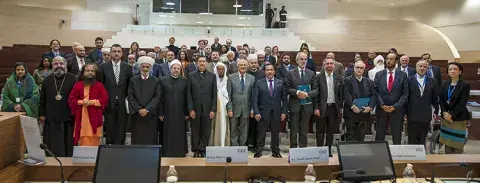

As the Extraordinary Jubilee of Mercy came to an end, His Holiness Pope Francis offered his understanding of mercy in an address to a multireligious audience that marked the beginning of an International Symposium jointly organised by the Pontifical Council for Interreligious Dialogue and the International Dialogue Centre (KAICIID), held from 3 to 4 November in Rome. During the event, over 60 religious leaders and exemplars of mercy engaged in dialogue that found in mercy a common value among religions, which must be part of daily practice.
“The mystery of mercy is not to be celebrated in words alone, but above all by deeds, by a truly merciful way of life marked by disinterested love, fraternal service and sincere sharing,” H.H. Pope Francis said.
“The religions are likewise called to this way of life, in order to be, particularly in our own day, messengers of peace and builders of communion, and to proclaim, in opposition to all those who sow conflict, division and intolerance, that ours is a time of fraternity. That is why it is important for us to seek occasions of encounter, an encounter which, while avoiding a superficial syncretism, makes us more open to dialogue, the better to know and understand one another; eliminates every form of closed-mindedness and disrespect; and drives out every form of violence and discrimination,” he added.
The International Symposium was motivated by the conviction that when believers appreciate that the value of mercy is revered by all religions, interreligious understanding will be significantly advanced. To achieve that understanding, religious leaders gathered in the Pontifical Gregorian University to share their insights. Ensuring the concept’s direct connection to building peace and alleviating real suffering, several individuals offered their stories as witnesses of mercy, further proof of the universality of mercy’s application by religions and cultures from all over the world.
Bishop Miguel Ayuso, Secretary of the Pontifical Council for Interreligious Dialogue and KAICIID Board Member, encouraged the participants to explore mercy as an element of peace. “Let us commit to use mercy not just in words but in deeds and fraternal service,” he said.
KAICIID Secretary General Faisal bin Muaammar was deeply moved by the Pope’s words emphasizing mercy as a fundamental value and a pillar for all religions. “We believe that dialogue is an expression of mercy. We need to transfer the value of mercy into law and lifestyles; it must be a daily practice,” he said. “It is our shared responsibility to make the world better through practicing mercy”.
The importance of dialogue and mercy in extreme situations was highlighted by several panelists. Participants agreed on the need to unite in mercy to counter violence in the name of religion.
KAICIID Board Member Rabbi Rosen said that through dialogue, we recognise our fundamental humanity and offer compassion. KAICIID Board Member Reverend Kosho Niwano referred to her visits to internally displaced persons in Jordan, Lebanon and Nigeria and realized in these encounters how the practice of mercy could help to overcome powerlessness.
Grand Mufti Sheikh Dr. Shawki Ibrahim Abdel-Karim Allam, Grand Mufti of Egypt, and Grand Mufti Abdel-Latif Derian, Grand Mufti of the Lebanese Republic, referred to the importance of mercy in Islam, mentioning as examples that the word “mercy” appears 268 times in the Koran, with the first verse of the Koran starting with “In the name of Allah the Most Gracious, the Most Merciful”. “Peace is a noble expression of mercy. A society void of mercy cannot be a society of peace, since peace and mercy are two faces of the same coin,” Grand Mufti Abdel-Latif Derian said.
In group dialogue, participants agreed that resisting the temptation of revenge in conflict is an act of mercy, only possible when mercy is learned. Everyone can exercise mercy. Mrs. Bibi Kaur, from the Sikh Shiromani Gurdwara Parbandha, explained that mercy is the quality of the brave, not a sign of weakness. Swami Chidanand Saraswati added that without mercy there is no peace, no reconciliation, no humanity.
Participants also mentioned concrete examples of how communities can make significant contributions by applying mercy especially in conflict situations. Bishop Elias Toumeh, for instance, highlighted how Syrian Christians and Muslims united without discrimination to provide aid in a time of war. H.H. Prince Breen Tahseen also described how the Yazidi community opened their houses without discrimination to Christian and Muslims who were fleeing violence and in need of mercy.